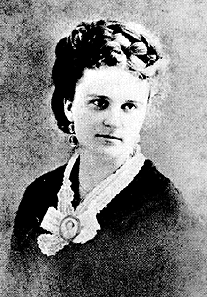
"Once more--for it is hard to be finite upon an infinite subject, and all subjects are infinite."
Melville, "Hawthorne and his Mosses"
An article today (astutely noted by Dr. X) describes the work of psychologist James Pennebaker, who is using textual analysis to examine the writings of those either suffering or recovering from mental illness. In short, he is looking at the prevalence of certain pronouns and other categories of words to try to get a quantifiable (always the holy grail it would seem) sense of a person's state of mind. Since narrative is such a hot paradigm these days, therapeutic writing is getting a closer look. While writing is virtually always a worthwhile endeavor, particularly if it aids recovery, I got to wondering whether any significant (in a narrowly literary sense) writing careers have originated primarily as a consciously therapeutic exercise. Only two came to mind: Anne Sexton and Kate Chopin, shown above (both women, alas, a fact I might get an earful/eyeful about).
Being the better known, Anne Sexton I mention only in passing. Apparently she had written some quality poems as a teenager, but any literary ambition went underground at least during her marriage and disastrous attempts at mainstream 1950's domestic life. After her breakdowns began, and under otherwise highly questionable therapeutic circumstances, Dr. Martin Orne saw her creative potential and suggested that she start writing. She was very reluctant and lacking in confidence at first, but she went to a poetry workshop, and the rest is literary history.
Kate Chopin (1850-1904) had also done some modest amateur writing as a young woman, but she put this aside in her 20's when she moved to Louisiana and bore five children. In the course of several years her husband's business ventures failed, he died in 1882, and then her mother died in 1885. Struggling with these losses and with the strains of single motherhood, she was advised by an obstetrician and friend to write. In the next fifteen years or so she wrote dozens of short stories, a number of which were published in national magazines. However, The Awakening, the short novel for which she is best known today, was critically panned at the time as both risque and generally without merit. For much of this century she was known if at all as a minor short story writer until around 1970, when feminism brought her overall work and especially The Awakening into higher esteem.
The Awakening takes place in a wonderfully recreated and languorous New Orleans. It is the story of Edna Pontellier, a middle-aged woman dismayed by her stultifying life with her husband, a financier of some type, who is often both geographically and emotionally distant. By the standards of the time, he is depicted as being only moderately chauvinistic, but I suppose the standards of the time may be the issue. But Mrs. Pointellier makes for an intriguing and not entirely sympathetic psychopathological study, and arguably her problems are more than feminist in scope; she struggles to connect with a number of people in her life, and while she initiates steps toward independence, she ultimately fails to decisively change her situation (in the way her author/creator succeeded in doing). Surprisingly for a quasi-feminist work, the end is tragic (or perhaps, from a sufficiently radical point of view, transcendent). But don't let that stop you--it is definitely worth a read (and it's not long).
John Stuart Mill famously recovered from a severe depression as a result of his encounter with English Romantic poetry (especially Wordsworth I believe), but I don't know that his own philosophical writing career was any direct outgrowth of that.
Obviously a great deal of writing (most? all?) is done for very good unconscious or implicit reasons, but I struggle to think of other well-known cases in which such writing began or really took off as a result of a medical recommendation. But I'm probably overlooking some obvious ones.
1 comment:
On a similar note, you should read the book Unholy Ghost: Writers on Depression. It is comprised of various writers, some well known, some not so, who have suffered from depression and have written about their experiences. The essays are very thoughtful and, speaking as an individual with severe depression, very accurate. It's a worthwhile read.
Post a Comment